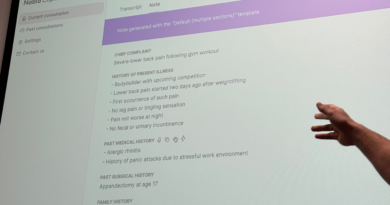The SBF trial continues, Atlassian acquires Loom, and OpenAI explores making its own chips
Happy Saturday, folks, and welcome to Week in Review (WiR), TechCrunch’s newsletter that covers the major stories in tech over the past several days.
I feel inclined to begin this edition with a sobering note about the recent events in Israel and Gaza. It’s obviously impacted the tech ecosystem there, but from a purely humanistic standpoint, it’s difficult to fathom, to make sense of, the level of destruction and bloodshed. We’re doing our best to amplify the voices of those on the ground, and, as the heartbreaking stories pour in, we’re hoping for signs of a peaceful resolution to the ongoing conflict.
In other news, the trial of disgraced crypto startup founder Sam Bankman-Fried continued, Atlassian acquired Loom, OpenAI reportedly explored developing its own AI chips, and Google made passkeys the default sign-in method for all users. Elsewhere, Adobe upgraded its generative AI tech, signs of a Spotify “Superpremium” service emerged, California passed an investment diversity disclosure law, and Brian reviewed the Meta Quest 3.
It’s a lot to get to, so we won’t delay. But first, a reminder to sign up here to get WiR in your inbox every Saturday if you haven’t already done so.
Most read
Alameda Research allegedly bribed Chinese officials: During the Sam Bankman-Fried trial on Wednesday, former Alameda Research CEO Caroline Ellison testified that the crypto trading firm paid Chinese officials to get their Alameda trading accounts on OKX and Huobi in China unlocked. That’s one of the many bombshells this week out of the Manhattan courthouse where SBF is being tried — see my dogged colleague Jacquelyn’s other reporting for more.
Atlassian acquires Loom for ~$1 billion: Atlassian announced on Thursday that it’s acquiring video messaging service Loom for $975 million. As Ron notes, Loom, which has 25 million customers and hosts more than 5 million video conversations per month, had a $1.53 billion valuation in May 2021 — but that was when companies were still thinking about all work being cloud-based and the future looked oh so bright.
OpenAI explores making AI chips: OpenAI, one of the best-funded AI startups in business, is considering making its own AI chips. Discussions of AI chip strategies within the company have been ongoing since at least last year, according to Reuters, as the shortage of chips to train AI models worsens. OpenAI is reportedly weighing a number of paths to advance its chip ambitions, including acquiring an AI chip manufacturer or mounting an effort to design chips internally.
Google makes passkeys the default: Google has announced that passkeys, touted by the tech giant as the “beginning of the end” for passwords, are becoming the default sign-in method for all users. As Carly writes, passkeys are a phishing-resistant alternative to passwords that allow users to sign into accounts using the same biometrics or PINs they use to unlock their devices, or with a physical security key.
Adobe upgrades Firefly: At Max, its annual conference for creatives, Adobe announced that it’s updated the models that power Firefly, its generative AI image creation service. According to Adobe, the Firefly Image 2 Model (as it’s officially called) will be better at rendering humans, for example, including facial features, skin, body and hands — which have long vexed similar models.
Spotify goes super-premium: Spotify’s rumored “Superpremium” offering might be gearing up for launch. According to references discovered in the Spotify app’s code by Chris Messina, the Superpremium service has a flashy logo and a long list of features beyond the 24-bit lossless audio that’s been anticipated. The feature set appears to include AI playlist generation tools, advanced mixing, additional hours of audiobook listening and a personalized offering called “Your Sound Capsule,” Sarah reports.
California mandates diversity investing disclosures: California governor Gavin Newsom has signed into law a bill that’ll require venture capital firms in the state to annually report the diversity of the founders that they’re backing. The bill is scheduled to go into effect on March 1, 2025. It’s the U.S.’s first piece of legislation that aims to increase diversity within the VC landscape, Dominic-Madori writes — a major win for activists.
Meta Quest 3 review: Brian reviewed the Meta Quest 3 this week, Meta’s latest VR headset. His overall impression? In a world where a $500 price point qualifies as cheap, Meta continues to be the best solution for casual extended reality. He writes: “If you’ve been waiting for a good excuse to pull the trigger on a VR headset, the Quest 3 presents a compelling case.”
Audio
Feeling a podcast to pass the time? Look no further than TechCrunch’s library, which surely has something that’ll scratch the itch.
The Equity crew parsed through the week’s news in startups and venture, beginning with ALIAVIA Ventures’ new fund, Canopy Servicing’s Series A1, a $200 million deal between a private equity group and EVPassport, which startups have flown through turbulence lately and, finally, whether technology can solve a labor shortage in construction.
Found featured a conversation with Giovanni Fili, the founder and CEO of Exeger, a startup that builds flexible solar cells that can create electric energy off of any light condition. Fili talked about what it’s been like devoting the last 15 years of his career to a company based on tech that hadn’t previously been proven to work and how he’s built a capital-intensive startup off of relatively little funding.
And Chain Reaction had a double feature this week. For the October 12 episode, Jacquelyn interviewed Grace Torrellas, Polygon Labs’ VP of product and zkEVM product lead and co-founder and executive director of Blockchain for Humanity. And this morning, Jacquelyn and Alex dove back into the Sam Bankman-Fried trial and what’s transpired over the past few days.
TechCrunch+
TC+ subscribers get access to in-depth commentary, analysis and surveys — which you know if you’re already a subscriber. If you’re not, consider signing up. Here are a few highlights from this week:
Medium climbs toward profitability: Medium has tried several different business models over the years — allowing individual publications on its platform to offer paywalls, building its own publications and more — and seen varying levels of success in the process. But Alex writes about how the company expects to get into the black in the first half of 2024.
Decarbonizing skyscrapers: Tim writes about how Bedrock Energy, a startup developing geothermal heating and cooling solutions for large buildings, is attempting to break into markets that had previously overlooked the technology.
Fearless Fund fallout: Fearless Fund, which provides grants and investments to women of color, has been indefinitely barred from deploying $20,000 grants to Black women in a judgment in a lawsuit brought by the American Alliance for Equal Rights. Dominic-Madori writes about how the suit could result in significant adverse ripple effects on the venture community’s efforts to promote diversity, equity and inclusion within the startup ecosystem.



